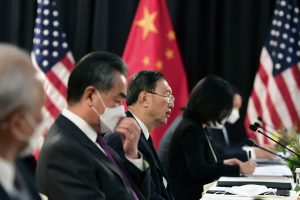At the U.S.-China High-Level Strategic Dialogue held in Anchorage, Alaska in March, Chinese State Councillor Yang Jiechi fired this broadside: “The United States is not qualified to talk to China in a condescending manner and the Chinese people will not accept that.” This statement was well received in China and t-shirts and other products bearing the words circulated among Chinese people.
It is by now well known that Chinese diplomats have become considerably more forceful in their pronouncements since April 2020, in an approach dubbed “wolf warrior diplomacy.” Blunt diplomacy is hardly without precedent of course, in China or elsewhere, but in this case the marked change in tone very likely reflects the fact that China is entering a particularly sensitive period, one in which not only diplomats but all Chinese government officials and politicians need to pay attention to what they say and do.
Since President Xi Jinping took power, Beijing has sought to position China as a more confident, assertive power. These efforts have been aided by factors such as its apparent success in controlling the COVID-19 pandemic and achieving an early economic recovery, and indeed support for the Xi administration is generally strengthening.
There is another facet, however, and that is a desire not to allow any perceived criticism or slight, whether from a foreign or domestic source, pass without response. Chinese diplomats and officials seen as compromising China’s honor in negotiations are potentially exposed to withering domestic criticism.
The applause in China for Yang’s statement reflects more than just the fact that he was seen as standing up to the U.S. A few days earlier, Xi himself had made much the same point at a meeting of the Political Consultative Conference, in comments about the confidence with which Chinese can now view the world. Xi’s comments made news for showing the current Chinese worldview, and Yang’s subsequent statements directed the same sentiment towards the U.S. Both remarks were well received within Chinese society.
This more feisty Chinese diplomacy is very likely to continue, at least for the time being. The 100th-year anniversary of the Chinese Communist Party began in 2021, and in the fall of 2022, a decision will be made on whether to extend Xi Jinping’s role as General Secretary of the Chinese Communist Party and whether he will take on the role of Chairman of the Chinese Communist Party at the 20th National Congress of the Chinese Communist Party. Then, in the spring of 2023, the National People’s Congress will decide if his role as president will be extended or not. Beyond Xi, the retirement and replacement of Premier Li Keqiang will be decided, along with many other personnel changes. For these reasons alone, the situation for Chinese politicians and diplomats will be tense. They will feel they have to highlight the successes of the Xi Jinping administration, and it will be taboo to slander the achievements. This narrows the scope for consideration in policymaking and naturally means that politicians will be sure not to stray from what President Xi Jinping says or does.
The COVID-19 pandemic has added more fuel to fire of the rigidity of Chinese diplomacy. One might consider the Chinese Communist Party a dictatorship or argue that the Xi administration is strengthening its administrative control, yet Chinese society remains highly diverse, and this diversity has been a factor in the country’s foreign relations. The government might have a resolution position, but until now we could count on a variety of positions within the country as a whole. However, at a time when Chinese foreign policy has become notably rigid, the diversity of private sector interactions with the outside world has been greatly suppressed. As such, we appear to be in a situation where flexibility and diversity have been lost, not just in diplomacy but in Chinese foreign relations overall.
As human mobility begins to recover, whether or not flexibility and diversity in Chinese foreign relations will also recover and whether this will replace the current rigid governmental diplomacy will become a key point in determining the future direction of Chinese foreign relations.
































